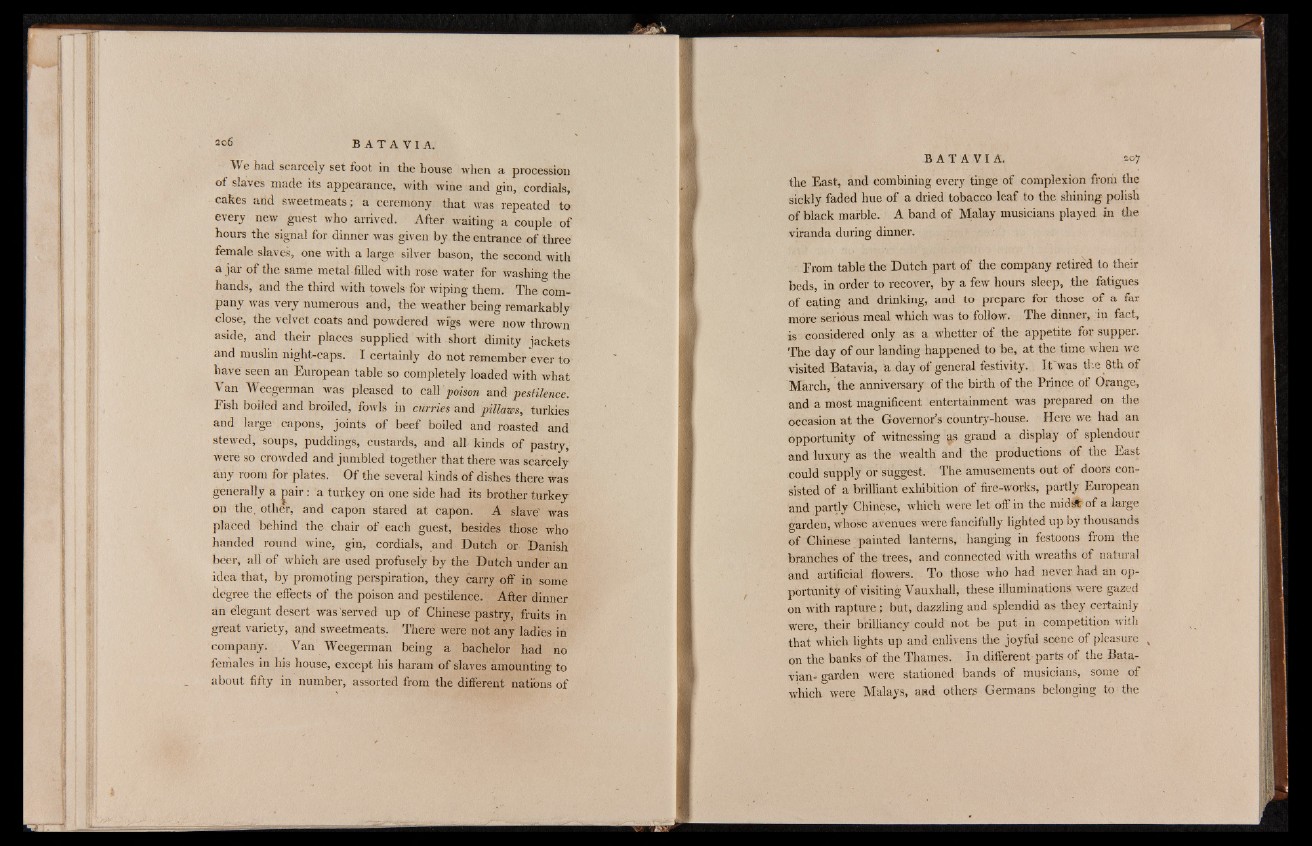
We had scarcely set foot in the house when a procession
of slaves made its appearance, with wine and gin, cordials,
cakes arid sweetmeats; a ceremony that was repeated to
every new guest who arrived. After waiting a couple of
hours the signal for dinner was given by the entrance of three
female slaves, one with a large silver bason, the second with
a j a r of the same metal filled with rose water for washino- the
hands, and the third with towels for wiping them. The company
was very numerous and, the weather being remarkably
close, the velvet coats and powdered wigs were now thrown
aside, and their places supplied with short dimity jackets
and muslin night-caps. I certainly do not remember ever to
have seen an European table so completely loaded with what
\ a n Weegerman was pleased to call poison and pestilence.
Fish boiled and broiled, fowls in curries and pillaws, turkies
and large capons, joints of beef boiled and roasted and
stewed, soups, puddings, custards, and all kinds of pastry,
were so crowded and jumbled together that there was scarcely
any room for plates. Of the several kinds of dishes there was
generally a p a ir; a turkey on one side had its brother turkey
op the. other, and capon stared at capon. A slave' was
placed behind the chair of each guest, besides those who
handed round wine, gin, cordials, and Dutch or Danish
beer, all of which are used profusely by the Dutch under an
idea that, by promoting perspiration, they carry off in some
degree the effects of the poison and pestilence. After dinner
an elegant desert was served up of Chinese pastry, fruits in
great variety, and sweetmeats. There were not any ladies in
company. Van Weegerman being a bachelor had no
females in his house, except his haram of slaves amounting to
about fifty in number, assorted from the different nations of
the East, and combining every tinge of complexion from the
sickly faded hue of a dried tobacco leaf to the shining polish
of black marble. A band of Malay musicians played in the
viranda during dinner.
From table the Dutch part of the company retired to their
beds, in order to recover, by a few hours sleep, the fatigues
of eating and drinking, and to prepare for those of a far
more serious meal which was to follow. The dinner, in fact,
is considered only as a whetter of the appetite for supper.
The day of our landing happened to be, at the time when we
visited Batavia, a day of general festivity. It'was the 8th of
March, the anniversary of the birth of the Prince ot Orange,
and a most magnificent entertainment was prepared on the
occasion a t the Governor’s country-house. Here we had an
opportunity of witnessing ^s grand a display of splendour
and luxury as the wealth and the productions of the East
could supply or suggest. The amusements out of doors consisted
of a brilliant exhibition of fire-works, partly European
and partly Chinese, which were let off in the mid# of a large
garden, whose avenues were fancifully lighted up by thousands
of Chinese painted lanterns, hanging in festoons from the
branches of the trees, and connected with wreaths of natural
and artificial flowers. To those who had never had an opportunity
of visiting Vauxhall, these illuminations were gazed
on with rapture; but, dazzling and splendid as they certainly
Were, their brilliancy could not be put in competition with
that which lights up and enlivens the joyful scene of pleasure ,
on the banks of the Thames. In different parts of the Batavian
garden were stationed bands of musicians, some of
which were Malays, aad others Germans belonging to the